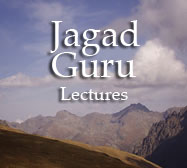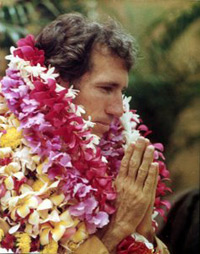The Foot-Prints of the Supreme Lord
From SREE SAJJANA-TOSHANI
THE HARMONIST
January 1931
In the Temple of Jagannath at Puri there exist the Foot-Prints of Lord Sri Chaitanya on the stone floor of the room at the entrance of the Temple. The Foot-Prints of the Supreme Lord receive the heart’s worship of countless devotees every day. It is quite possible to pass this by as of no importance to any one in particular. It is also not impossible to find flaws. But are we sure that we really understand the psychology of devotion as it really is?
The fashionable philosophy of Immanence will say that Godhead is Present in everything. But will it also admit that He is specially Present in anything? Will it admit further that He has got a particular Form ‘of His Own’? It will most possibly suppose that the worship of the Foot Prints of the Supreme Lord is only a kind of devout anthropomorphism.
It is not, therefore, possible for the fashionable professors of the current forms of the so-called doctrines of Immanence and Transcendence to admit the Divinity of an apparently well-known historical personage like Lord Sri Chaitanya. But neither are those professors in a very tenable position if they try seriously to justify their attitude of objection.
It is, of course, quite easy for any person to argue the case in favour of the personality of the Supreme Lord. We need not repeat all those arguments at this place. We shall take it for granted, as an axiomatic Truth in the absolute sense, that the Supreme Lord certainly possesses the Perfection of Personality. Our next postulate is that the Divine Personality Proper ‘corresponds’ to that of a human being. Our argument is not that the Lord is bound to be human in order to be capable of being related to man in any intimate and complete manner. Our proposition is that the Divine Personality corresponds both specifically and absolutely to the human.
We also contend that this is no mere irrational dogma. It is capable of being established by the ordinary class of logical arguments to the complete satisfaction of the Logicians, if such satisfaction is really capable of touching the issue at all.
What after all is really the nature of what we are pleased to call, in and out of season, as the human personality? Is not such a phrase as human personality itself a gross contradiction in terms to a consistent Logician? Is it not also really begging the question at issue? What in this sense would be such an entity as the dog’s personality? Does it mean anything connected with the external form of that useful animal? Does it refer to any peculiar mental states of the species? We should say that we do not really know. Because the personality is not an external object. What does the dog claim for himself as his personality? It is, of course, possible for the master of a dog to describe the disposition of his favourite in a manner which may appear to him to be more or less complete. Will such description be regarded as the personality of the dog? We should unhesitatingly say ‘No’.
The personality is, if at all, a self-conscious principle. Has a dog got any such principle? He appears to have none. We have at present no means of knowing if he has. If the dog could communicate himself to me in any reciprocal way which would leave no doubt in my mind as regards the whole chain of his cognitions then also I could not be sure that I really know him as he really is. I must like to be further satisfied that he is not deceiving me or himself. I would ask, ‘Does the dog also really know and express himself?’ After all these conditions have been fully satisfied I would still remain prepared for changing my conviction if necessary in the light of further experience. Thus I would remain practically where I was at the very beginning of my enquiry.
Personality may, therefore, be defined as a perfectly self-conscious entity in reciprocal relations with other like entities as expressible in terms of any one of the latter. What, if any such thing there be at all, is then the thing which we are pleased to call human personality?
We have agreed to call him the soul. Is the soul that inhabits the human form in any permanent and recognisable way different from the corresponding entity, if any, inhabiting the form of the dog? We are not in a position to answer the question, because we are not really acquainted with either of them.
The Scriptures say that there are differences in the souls that correspond to those of the external forms. It is for this reason that it has been possible to describe the happenings of the spiritual world in the language of this. As in this world man occupies a position of superiority to the so-called lower animals and there is no condition that can be conceived as more enviable than his, on the whole, so also in the corresponding realm of the spirit the human is the most enviable of all condition. God-head is the Highest Reciprocal Human Person of the spiritual realm.
The Lord is never human in the anthropomorphic sense. The Humanity of the Supreme Lord is capable of fully preserving His super-human status. The full man includes the conceptions of male and female. Both principles are combined in the Supreme Person as their real and ultimate Source. But the Personality of the Lord also embraces every other entity. This is not in human nature. Man is only one distinct species. Even human soul, as in the spiritual realm, does not possess the Greatness and unlimitedness of the Divine soul. For one thing the two are always distinguishable as Source and His derivatives. The source is one and common to all the different species of individual souls. The individual soul is of the nature of power and not of the Nature of the Possessor and Source of power. The individual soul can, indeed, be absorbed in his Source by the Will of Divinity; but he can never be Divinity. He can have his own distinctive existence as a strictly subsidiary entity by the Will of the Divinity.
It is possible for the individual soul to know Divinity in any form and measure according to the Will of Divinity. The individual soul cannot know Divinity otherwise than by His causeless grace. But this does not reduce him to any condition less than the fully spiritual. The Divine Nature and Divine Omniscience are communicable to the individual soul by the Will of Divinity, but he still remains in his own right what he really is.
Those who were so empowered by Sri Chaitanya, were made fully aware of all these implications of their relationship with the Supreme Lord. They did not profess to be either anthropomorphists or Divinities in embryo. But they were aware of the Divinity of Sri Chaitanya by His own right.
Those who affect to disbelieve the doctrine of Appearance of the Divinity to the limited view of mortals in His Own Proper Form of the Divine-Human, must be judged to be given to perversely dogmatising on the most serious of all the concerns of life and one to which they know they have at present no access what-so-ever. It is perfectly open to the Lord to behave in any way. It is not possible for our present muddy understandings to think, without dogmatic assumptions, on any subject. We may be disposed, in our hollow vanity, to question the competence even of the Supreme Lord to go against our dogmatisms. But such an attitude will not help anybody to arrive at the Truth.
The Lord possesses everything, and, therefore, also possesses Hands and Feet of His Own. His Foot-Prints also reserve the power of appearing to the view of the people of this world and without forfeiting their Divine and superspiritual Nature. The worship of the Divine Foot-Prints of Sri Gaursundar by the highest of devotees, therefore, need cause no disbelief in any person by merely appearing to be anthropomorphic.


